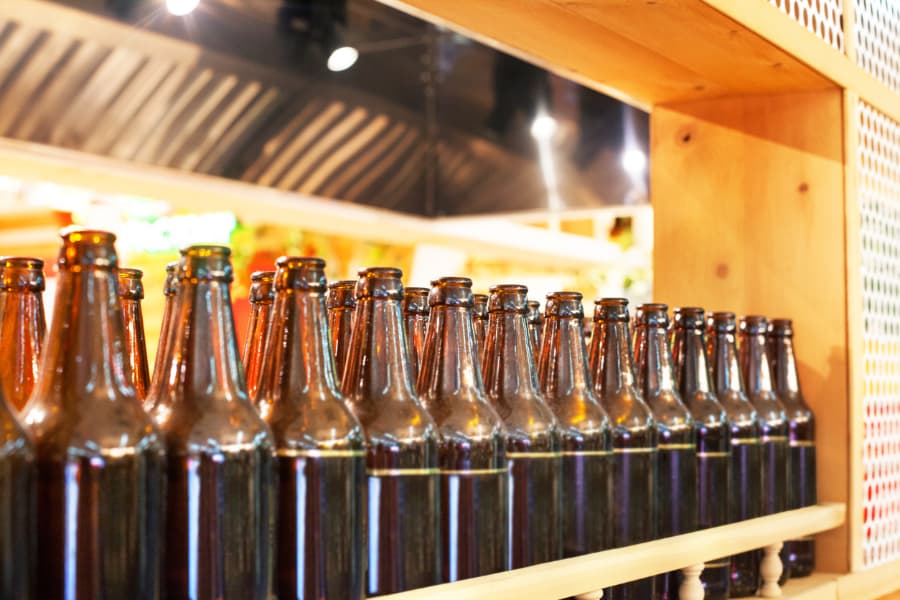
Nothing lasts forever, not even beer. Light, air, and sudden changes in temperature can all impact how long your beer remains good to drink. Knowing how to properly store it can help to retain the quality and flavor for longer periods. Here, Columbia Distributing goes over the proper ways to store your beer so that it tastes good whenever you decide to crack one open.
What Beers Can Be Stored for Longer Periods?
Before you consider storing your beer, it’s important to know which types can be stored and which ones should be enjoyed soon after purchasing. Typically, Belgian strong ales and quads, barley wines, imperial stouts, and sour beers can all be stored for longer periods of time. In the right conditions, these types of beers can be stored for years if they’re in bottles.
On the other hand, IPAs and lagers should be enjoyed while fresh. For IPAs, this is because of the strong hop-forward flavor. Hoppy beers will get a stale flavor if stored for too long. When it comes to American-style lagers, beers like Budweiser and Miller should be drunk within a few months of purchase.
Store Beer Where It’s Cool
When it comes to finding the perfect storage temperature for beer, you don’t want it too hot or too cold but just right.
The first thing to consider is the temperature at which you’re acquiring the beer. If you purchase a beer that’s already been chilled, you should only keep it in your refrigerator. For example, if a brewery is selling cold bottle-conditioned sour beer, you won’t be able to take it home and store it in an unrefrigerated space.
When your refrigerator isn’t maintaining the right temperature for your beer or other perishables, it’s essential to act quickly to avoid spoilage. Whether it’s an issue with inconsistent cooling, a noisy compressor, or water leaks, troubleshooting and fixing these problems early can save you from bigger headaches down the line. For example, if your fridge isn’t cooling evenly, it might be as simple as cleaning dirty condenser coils or clearing blocked air vents. Addressing these small issues ensures your beverages stay at the perfect serving temperature, and it also extends the life of your refrigerator.
On the other hand, more complex issues like a malfunctioning thermostat or a failing compressor often require professional repair services. These experts have the tools and knowledge to handle advanced diagnostics and ensure your refrigerator operates efficiently. Whether it’s for a high-performance fridge in your home bar or a reliable kitchen workhorse, proper maintenance and timely repairs ensure your beer and other items are stored at their ideal temperature.
It’s also important to remember that different brands of beer age differently depending on their storage conditions. Beers will age more quickly than they should when storage temperatures get too hot, which can impact the flavor. Heat also encourages bacterial growth, which could give your beer a bitter or musty flavor that renders it undrinkable. Temperatures that are too hot also wreak havoc on unpasteurized, unfiltered beers that still contain live, active yeast. When temperatures rise, the active yeast can alter your beer’s alcohol content and flavor.
Conversely, storing beer in freezing conditions isn’t the best idea either. The increased pressure in the beer can or bottle will likely make it explode, leading to a real mess and loss of your beer.
For the best results, ensure you keep your beer in a cool, dry place. The ideal space won’t get too hot in the summer or too cold in the winter. Typically, if your home has a basement, this can be the optimal space to store beer. But also, the back of a closet can work in a pinch.
UV Protection
Beer and sunlight don’t mix. While there’s nothing more satisfying than quenching your thirst with a cold beer on a sunny day, it should be kept in the shade on ice so that it doesn’t skunk.
Sunlight is the most notorious culprit for beer spoilage and contributes to that dreaded skunky smell and taste. The repelling aroma results from a chemical reaction from volatile compounds that are broken down when exposed to direct sunlight, which changes those compounds into other chemicals, including the same chemical found in a skunk’s spray.
When it comes to long-term storage, it is vital to store your beer in a dark, dry room. Beers that come in clear glass bottles will benefit more from this compared to beers stored in green or brown bottles, which act like sunglasses. However, it’s still advisable to store all beer in a dark location that doesn’t get any direct sunlight.
Store in an Upright Position
One of the trickier questions about how to store beer has to do with the bottle positioning in the cellar or fridge. Unlike wine, you must always keep beer bottles in an upright position when possible. This is because upright storage limits the amount of oxygen that gets into the beer.
When stored in an upright position, the narrow bottleneck ensures only a tiny portion of beer reacts with the air inside the bottle. The reduced surface area in contact with air cuts down on oxygenation that ages beer.
Upright storage is even more important for unfiltered beers to allow yeast remains to settle at the bottom of the beer bottle. Tipping the beer bottle on its side during storage will allow the dregs to float in the bottle and create a yeast ring around the bottle’s sides.
Learn More About How to Store Beer at Columbia Distributing
Knowing how to store beer and protect it from the elements is critical for a great drinking experience. At Columbia Distributing, we provide beer that has been stored properly so that you can add to your cellar collection without sacrificing quality or taste. Contact us for more beer storage tips today.